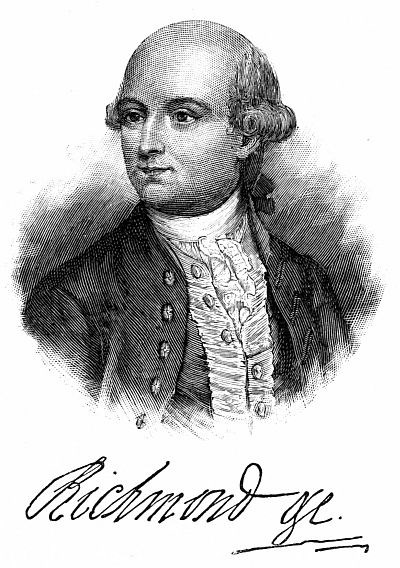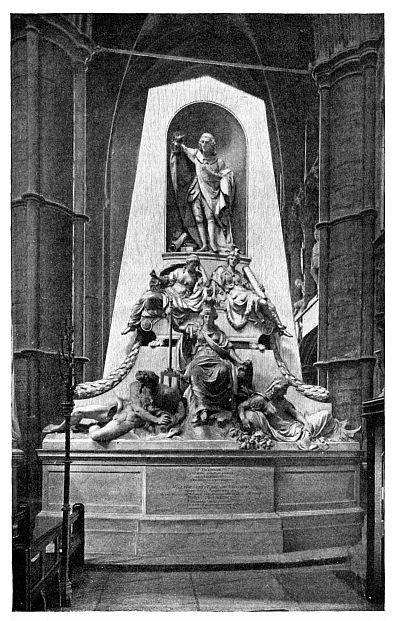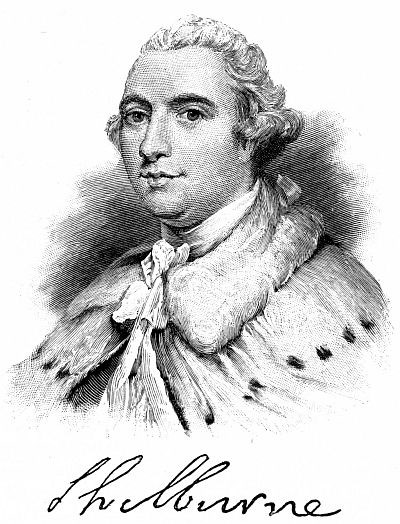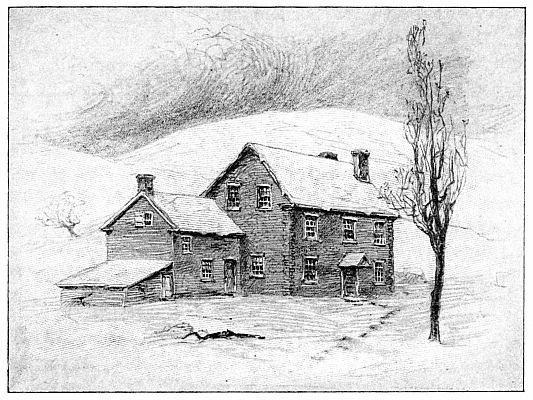 полная версия
полная версияThe American Revolution

The Duke of Richmond, anxious to bring matters to an issue, gave notice that on the 7th of April he should move that the royal fleets and armies should be instantly withdrawn from America, and peace be made on whatever terms Congress might see fit to accept. Such at least was the practical purport of the motion. For such an unconditional surrender Chatham was not yet ready, and on the appointed day he got up from his sick-bed and came into the House of Lords to argue against the motion. Wrapped in flannel bandages and leaning upon crutches, his dark eyes in their brilliancy enhancing the pallor of his careworn face, as he entered the House, supported on the one side by his son-in-law, Lord Mahon, on the other by that younger son who was so soon to add fresh glory to the name of William Pitt, the peers all started to their feet, and remained standing until he had taken his place. In broken sentences, with strange flashes of the eloquence that had once held captive ear and heart, he protested against the hasty adoption of a measure which simply prostrated the dignity of England before its ancient enemy, the House of Bourbon. The Duke of Richmond’s answer, reverently and delicately worded, urged that while the magic of Chatham’s name could work anything short of miracles, yet only a miracle could now relieve them from the dire necessity of abandoning America. The earl rose to reply, but his overwrought frame gave way, and he sank in a swoon upon the floor. All business was at once adjourned. The peers, with eager sympathy, came crowding up to offer assistance, and the unconscious statesman was carried in the arms of his friends to a house near by, whence in a few days he was removed to his home at Hayes. There, after lingering between life and death for several weeks, on the 11th of May, and in the seventieth year of his age, Lord Chatham breathed his last.
His prodigious greatnessThe man thus struck down, like a soldier at his post, was one whom Americans no less than Englishmen have delighted to honour. The personal fascination which he exerted in his lifetime is something we can no longer know; but as the field of modern history expands till it covers the globe, we find ourselves better able than his contemporaries to comprehend the part which he played at one of the most critical moments of the career of mankind. For simple magnitude, the preponderance of the English race in the world has come now to be the most striking fact in human history; and when we consider all that is implied in this growing preponderance of an industrial civilization over other civilizations of relatively archaic and militant type, we find reason to believe that among historic events it is the most teeming with mighty consequences to be witnessed by a distant future. With no other historic personage are the beginnings of this supremacy of the English race so closely associated as with the elder William Pitt. It was he who planned the victories which gave England the dominion of the sea, and which, rescuing India from the anarchy of centuries, prepared it to become the seat of a new civilization, at once the apt pupil and the suggestive teacher of modern Europe. It was he who, by driving the French from America, cleared the way for the peaceful overflow of our industrial civilization through the valley of the Mississippi; saving us from the political dangers which chronic warfare might otherwise have entailed, and insuring us the ultimate control of the fairest part of this continent. To his valiant and skilful lieutenants by sea and land, to such great men as Hawke, and Clive, and Wolfe, belongs the credit of executing the details; it was the genius of Pitt that conceived and superintended the prodigious scheme as a connected whole. Alone among the Englishmen of his time, Pitt looked with prophetic gaze into the mysterious future of colonial history, and saw the meaning of the creation of a new and greater Europe in the outlying regions of the earth; and through his triumphs it was decided that this new and greater Europe should become for the most part a new and greater England, – a world of self-government, and of freedom of thought and speech. While his political vision thus embraced the uttermost parts of the globe, his action in the centre of Europe helped to bring about results the importance of which we are now beginning to appreciate. From the wreck of all Germany in that horrible war of religion which filled one third of the seventeenth century, a new Protestant power had slowly emerged and grown apace, till in Pitt’s time – for various reasons, dynastic, personal, and political – it had drawn down upon itself the vengeance of all the reactionary countries of Europe. Had the coalition succeeded, the only considerable Protestant power on the continent would have been destroyed, and the anarchy which had followed the Thirty Years’ War might have been renewed. The stupid George II., who could see in Prussia nothing but a rival of Hanover, was already preparing to join the alliance against Frederick, when Pitt overruled him, and threw the weight of England into the other side of the scale. The same act which thus averted the destruction of Prussia secured to England a most efficient ally in her struggle with France. Of this wise policy we now see the fruits in that renovated German Empire which has come to be the strongest power on the continent of Europe, which is daily establishing fresh bonds of sympathy with the people of the United States, and whose political interests are daily growing more and more visibly identical with those of Great Britain. As in days to come the solidarity of the Teutonic race in its three great nationalities – America, England, and Germany – becomes more and more clearly manifest, the more will the student of history be impressed with the wonderful fact that the founding of modern Germany, the maritime supremacy of England, and the winning of the Mississippi valley for English-speaking America, were but the different phases of one historic event, coherent parts of the one vast conception which marks its author as the grandest of modern statesmen. As the lapse of time carries us far enough from the eighteenth century to study it in its true proportions, the figure of Chatham in the annals of the Teutonic race will appear no less great and commanding than the figure of Charlemagne a thousand years before.

CHATHAM’S TOMB IN WESTMINSTER ABBEY
But Chatham is interesting to Americans not only as the eloquent defender in our revolutionary struggle, not only as standing in the forefront of that vast future in which we are to play so important a part, but also as the first British statesman whose political thinking was of a truly American type. Pitt was above all things the man of the people, and it has been well said that his title of the “Great Commoner” marks in itself a political revolution. When the king and the Old Whig lords sought to withstand him in the cabinet, he could say with truth, “It is the people who have sent me here.” He was the first to discover the fact that the development of trade and manufactures, due chiefly to the colonial expansion of England, had brought into existence an important class of society, for which neither the Tory nor the Old Whig schemes of government had made provision. He was the first to see the absurdity of such towns as Leeds and Manchester going without representation, and he began in 1745 the agitation for parliamentary reform which was first successful in 1832. In the celebrated case of Wilkes, while openly expressing his detestation of the man, he successfully defended the rights of constituencies against the tyranny of the House of Commons. Against the fierce opposition of Lord Mansfield, he maintained inviolate the liberty of every Englishman to publish his opinions. He overthrew the abuse of arbitrary imprisonment by general warrants. He ended the chronic troubles of Scotland by taking the Highlanders into his confidence and raising regiments from them for the regular army. In this intense devotion to liberty and to the rights of man, Pitt was actuated as much by his earnest, sympathetic nature as by the clearness and breadth of his intelligence. In his austere purity of character, as in his intensity of conviction, he was an enigma to sceptical and frivolous people in his own time. Cromwell or Milton would have understood him much better than did Horace Walpole, to whom his haughty mien and soaring language seemed like theatrical affectation. But this grandiose bearing was nothing but the natural expression of that elevation of soul which, lighted by a rich poetic imagination and fired by the glow of passion beneath, made his eloquence the most impressive that has ever been heard in England. He was soaring in outward demeanour only as his mind habitually dwelt with strong emotion upon great thoughts and noble deeds. He was the incarnation of all that is lofty and aspiring in human nature, and his sublime figure, raised above the grave in the northern transept of Westminster Abbey, with its eager outstretched arm, still seems to be urging on his countrymen in the path of duty and of glory.

By the death of Chatham the obstacles which had beset the king were suddenly removed. On the morning after the pathetic scene in the House of Lords, he wrote with ill-concealed glee to North, “May not the political exit of Lord Chatham incline you to continue at the head of my affairs?” North was very unwilling to remain, but it was difficult to find any one who could form a government in his place. Among the New Whigs, now that Chatham was gone, Lord Shelburne was the most prominent; but he was a man who, in spite of great virtues and talents, never succeeded in winning the confidence either of the politicians or of the people. He was a warm friend to the American cause, but no one supposed him equal to the difficult task which Chatham would have undertaken, of pacifying the American people. The Old Whigs, under Lord Rockingham, had committed themselves to the full independence of the United States, and for this the people of England were not yet prepared. Under the circumstances, there seemed to be nothing for Lord North to do but remain in office. The king was delighted, and his party appeared to have gained strength from the indignation aroused by the alliance of the Americans with France. It was strengthened still more by the positive refusal of Congress to treat with the commissioners sent over by Lord North. The commissioners arrived in America in June, and remained until October, without effecting anything. Congress refused to entertain any propositions whatever from Great Britain until the independence of the United States should first be acknowledged.
His commissioners in America fail to accomplish anythingCopies of Lord North’s conciliatory bills were published by order of Congress, and scattered broadcast over the country. They were everywhere greeted with derision; at one town in Rhode Island they were publicly burned under a gallows which had been erected for the occasion. After fruitlessly trying all the devices of flattery and intrigue, the commissioners lost their temper; and just before sailing for England they issued a farewell manifesto, in which they threatened the American people with exemplary punishment for their contumacy. The conduct of the war, they said, was now to be changed; these obstinate rebels were to be made to suffer the extremes of distress, and no mercy was to be shown them. Congress instantly published this document, and it was received with somewhat more derision than the conciliatory bills had been. Under the circumstances of that day, the threat could have but one meaning. It meant arson along the coasts at the hands of the British fleet, and murder on the frontiers at the hands of Indian auxiliaries. The commissioners sought to justify their manifesto before Parliament, and one of them vehemently declared that if all hell could be let loose against these rebels, he should approve of the measure. “The proclamation,” said he, “certainly does mean a war of desolation: it can mean nothing else.” Lord Rockingham denounced the policy of the manifesto, and few were found in Parliament willing to support it openly. This barbarous policy, however, was neither more nor less than that which Lord George Germain had deliberately made up his mind to pursue for the remainder of the war. Giving up the problem of conquering the Americans by systematic warfare, he thought it worth while to do as much damage and inflict as much suffering as possible, in the hope that by and by the spirit of the people might be broken and their patience worn out. No policy could be more repugnant to the amiable soul of Lord North, but his false position obliged him passively to sanction much that he did not like. Besides this plan for tiring out the people, it was designed to conduct a systematic expedition against Virginia and the Carolinas, in order to detach these states from the rest of the confederacy. Should it be found necessary, after all, to acknowledge the independence of the United States, it seemed worth while at least to cut down their territory as much as possible, and save to the British Crown these rich countries of rice, and indigo, and tobacco. Such was the plan now proposed by Germain, and adopted by the ministry of which he was a member.
CHAPTER IX
VALLEY FORGE
Distress in AmericaLord George Germain’s scheme for tiring out the Americans could not seem altogether hopeless. Though from a military point of view the honours of the war thus far remained with them, yet the losses and suffering had been very great. The disturbance of trade was felt even more severely in America than in England, and it was further exacerbated by the evils of a depreciated currency. The country had entered into the war heavily handicapped by the voluntary stoppage of importation which had prevailed for several years. The war had cut off New England from the Newfoundland fisheries and the trade with the West Indies, and the coasting trade had been nearly annihilated by British cruisers. The problem of managing the expenses of a great war was something quite new to the Americans, and the consequent waste and extravagance were complicated and enhanced by the curse of paper money. Congress, as a mere advisory body, could only recommend to the various states the measures of taxation which were deemed necessary for the support of the army. It had no authority to raise taxes in any state, nor had it any power to constrain the government of a state to raise taxes. The states were accordingly all delinquent, and there was no resource left for Congress but to issue its promissory notes. Congress already owed more than forty million dollars, and during the first half of the year 1778 the issues of paper money amounted to twenty-three millions. The depreciation had already become alarming, and the most zealous law-making was of course powerless to stop it.
Lack of organizationUntil toward the close of the Revolutionary War, indeed, the United States had no regularly organized government. At the time of the Declaration of Independence a committee had been appointed by Congress to prepare articles of confederation, to be submitted to the states for their approval. These articles were ready by the summer of 1778, but it was not until the spring of 1781, that all the states had signed them. While the thirteen distinct sovereignties in the United States were visible in clear outline, the central government was something very shadowy and ill-defined. Under these circumstances, the military efficiency of the people was reduced to a minimum. The country never put forth more than a small fraction of its available strength. Everything suffered from the want of organization. In spite of the popular ardour, which never seems to have been deficient when opportunities came for testing it, there was almost as much difficulty in keeping up the numbers of the army by enlistment as in providing equipment, sustenance, and pay for the soldiers when once enlisted. The army of 80,000 men, which Congress had devised in the preceding year, had never existed except on paper. The action of Congress had not, indeed, been barren of results, but it had fallen far short of the end proposed. During the campaigns of 1777 the army of Washington had never exceeded 11,000 men; while of the 20,000 or more who witnessed the surrender of Burgoyne, at least half were local militia, assembled merely to meet the exigencies of the moment. The whole country, indeed, cherished such a horror of armies that it was unjust even to the necessary instrument by which its independence was to be won; and it sympathized with Congress in the niggardly policy which, by discouraging pensions, endangered the future of brave and skilful officers who were devoting the best years of their lives to the public service. Washington’s earnest efforts to secure for retired officers the promise of half pay for life succeeded only in obtaining it for the term of seven years. The excessive dread of a standing army made it difficult to procure long enlistments, and the frequent changes in the militia, besides being ruinous to discipline, entailed a sad waste of equipments and an interruption of agriculture which added much to the burdens of the people.

WASHINGTON’S HEADQUARTERS AT VALLEY FORGE
Vexatious meddling of Congress
Besides these evils, for which no one in particular was to blame, since they resulted so directly from the general state of the country, the army suffered under other drawbacks, which were immediately traceable to the incapacity of Congress. Just as afterwards, in the War of Secession, the soldiers had often to pay the penalty for the sins of the politicians. A single specimen of the ill-timed meddling of Congress may serve as an example. At one of the most critical moments of the year 1777, Congress made a complete change in the commissariat, which had hitherto been efficiently managed by a single officer, Colonel Joseph Trumbull. Two commissary-generals were now appointed, one of whom was to superintend the purchase and the other the issue of supplies; and the subordinate officers of the department were to be accountable, not to their superiors, but directly to Congress. This was done in spite of the earnest opposition of Washington, and the immediate result was just what he expected. Colonel Trumbull, who had been retained as commissary-general for purchases, being unable to do his work properly without controlling his subordinate officers, soon resigned his place. The department was filled up with men selected without reference to fitness, and straightway fell into hopeless confusion, whereby the movements of the armies were grievously crippled for the rest of the season. On the 22d of December Washington was actually prevented from executing a most promising movement against General Howe, because two brigades had become mutinous for want of food.
Sufferings at Valley ForgeFor three days they had gone without bread, and for two days without meat. The quartermaster’s department was in no better condition. The dreadful sufferings of Washington’s army at Valley Forge have called forth the pity and the admiration of historians; but the point of the story is lost unless we realize that this misery resulted from gross mismanagement rather than from the poverty of the country. As the poor soldiers marched on the 17th of December to their winter quarters, their route could be traced on the snow by the blood that oozed from bare, frost-bitten feet; yet at the same moment, says Gordon, “hogsheads of shoes, stockings, and clothing were lying at different places on the roads and in the woods, perishing for want of teams, or of money to pay the teamsters.” On the 23d, Washington informed Congress that he had in camp 2,898 men “unfit for duty, because they are barefoot, and otherwise naked.” For want of blankets, many were fain “to sit up all night by fires, instead of taking comfortable rest in a natural and common way.” Cold and hunger daily added many to the sick-list; and in the crowded hospitals, which were for the most part mere log-huts or frail wigwams woven of twisted boughs, men sometimes died for want of straw to put between themselves and the frozen ground on which they lay. In the deficiency of oxen and draft-horses, gallant men volunteered to serve as beasts of burden, and, yoking themselves to wagons, dragged into camp such meagre supplies as they could obtain for their sick and exhausted comrades. So great was the distress that there were times when, in case of an attack by the enemy, scarcely two thousand men could have been got under arms. When one thinks of these sad consequences wrought by a negligent quartermaster and a deranged commissariat, one is strongly reminded of the remark once made by the eccentric Charles Lee, when with caustic alliteration he described Congress as “a stable of stupid cattle that stumbled at every step.”
Promoting officers for non-military reasonsThe mischief did not end, however, with the demoralization of the departments that were charged with supplying the army. In the appointment and promotion of general officers, Congress often acted upon principles which, if consistently carried out, would have ruined the efficiency of any army that ever existed. For absurdly irrelevant political reasons, brave and well-tried officers were passed by, and juniors, comparatively little known, were promoted over their heads. The case of Benedict Arnold was the most conspicuous and flagrant example of this. After his good name had been destroyed by his treason, it became customary for historians to cite the restiveness of Arnold under such treatment as one more proof of his innate wickedness. But Arnold was not the only officer who was sensitive about his rank. In June, 1777, it was rumoured about Washington’s camp that a Frenchman named Ducoudray was about to be appointed to the chief command of the artillery, with the rank of major-general. Congress was continually beset with applications from vagrant foreign officers in quest of adventure; and such appointments as this were sometimes made, no doubt, in that provincial spirit which it has taken Americans so long to outgrow, and which sees all things European in rose-colour. As soon as the report concerning Ducoudray reached the camp, Generals Greene, Sullivan, and Knox each wrote a letter to Congress, proffering their resignations in case the report were true; and the three letters were dated on the same day. Congress was very angry at this, and the three generals were abused without stint. The affair, however, was more serious than Congress had supposed, and the contemplated appointment of Ducoudray was not made.
Absurd talk of John AdamsThe language of John Adams with reference to matters of this sort was more pungent than wise, and it gave clear expression to the principles upon which Congress too often acted. This “delicate point of honour” he stigmatized as “one of the most putrid corruptions of absolute monarchy.” He would be glad to see Congress elect all the general officers annually; and if some great men should be obliged to go home in consequence of this, he did not believe the country would be ruined! The jealousy with which the several states insisted upon “a share of the general officers” in proportion to their respective quotas of troops, he characterized as a just and sound policy. It was upon this principle, he confessed, that many promotions had been made; and if the generals were so unreasonable as not to like it, they must “abide the consequences of their discontent.” Such expressions of feeling, in which John Adams found many sympathizers, bear curious testimony to the intense distrust with which our poor little army was regarded on account of the monarchical tendencies supposed to be necessarily inherent in a military organization. This policy, which seemed so “sound” to John Adams, was simply an attempt to apply to the regimen of the army a set of principles fit only for the organization of political assemblies; and if it had been consistently adopted, it is probable that Lord George Germain’s scheme of tiring the Americans out would have succeeded beyond his most sanguine expectations.







